What we've learned ahead of the Olympic men's hockey knockout round
The Olympic men's hockey preliminary round is done, and knockout action begins Monday night ET. Here's what we've learned about Canada, the United States, and the rest of the medal contenders.
The prospects are shining
Late in the second period of Canada-China, Kent Johnson stepped over the Canadian bench and found the puck immediately. Gifted time and space, he glided below the faceoff dot and wired a wrist shot five-hole for his first Olympic goal.
Johnson, Canada's most dangerous forward in the preliminary round, wasn't on the 25-man roster to begin the tournament. Summoned from the taxi squad after Daniel Carr tested positive for COVID-19, Johnson has thrived alongside Ben Street and Eric O'Dell. He protects the puck, is nimble and creative, and can pass or fire on net. He recorded two assists against Germany and five shots against the U.S. before his goal erased China's momentum on Sunday.
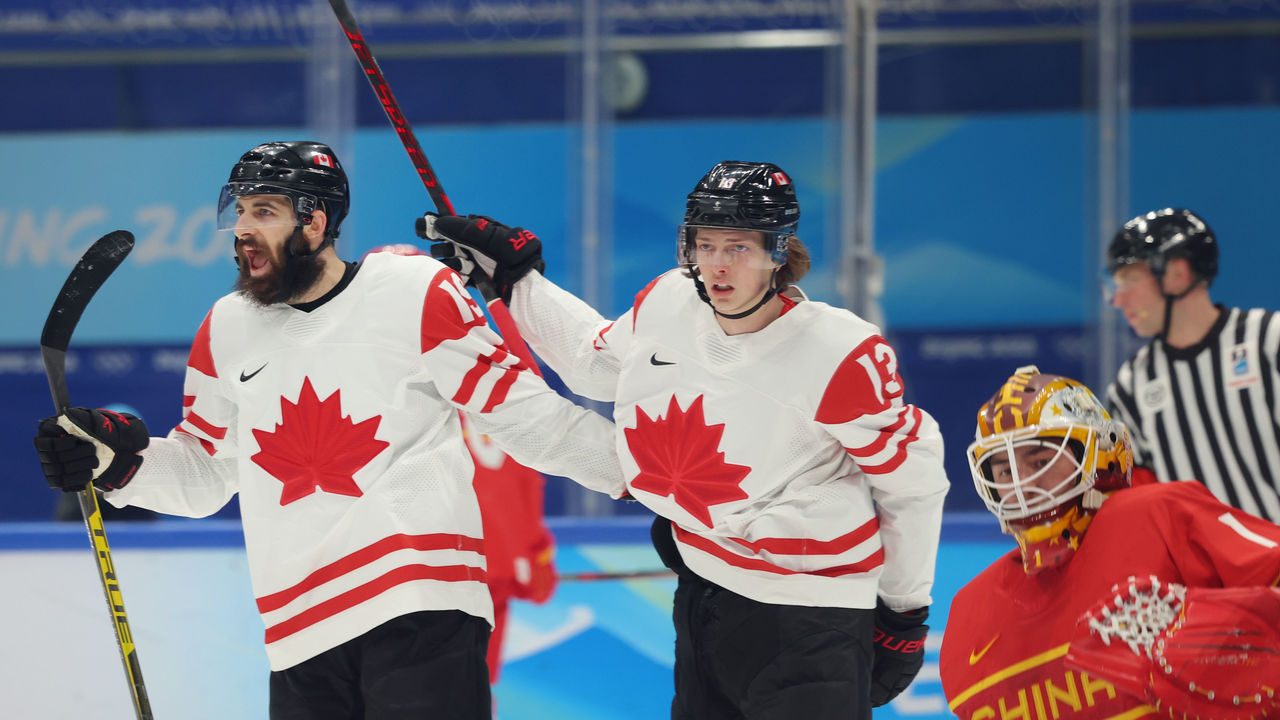
Johnson embodies a trend: young talent is uplifting the North American teams in Beijing. Owen Power, last year's top NHL draft pick, leads Canada in ice time and has enlivened the offense with his fleet feet, coolness with the puck, and vision. Mason McTavish rang the crossbar twice in Canada's loss to the U.S., flashing the potent shot that might swing a knockout game if he can be more precise.
The American young guns have shown more than flashes. The preliminary round's top scorer (Sean Farrell, six points) and goaltender (Drew Commesso, .964 save percentage) headline the cohort of 15 college players the U.S. sent to China. Team USA bet they'd be capable of defending veteran teams with structure, matching their physicality, and punishing them with speed.
They've done just that. Matty Beniers' regrettable pinch let Canada score shorthanded, but he's playing 20 minutes nightly in all situations, emerging at 19 years old as a go-to center. Brendan Brisson scored against China and Canada. Nick Abruzzese's hustle and playmaking in the offensive zone set up two goals - one from Matthew Knies - that powered the U.S. past Germany.
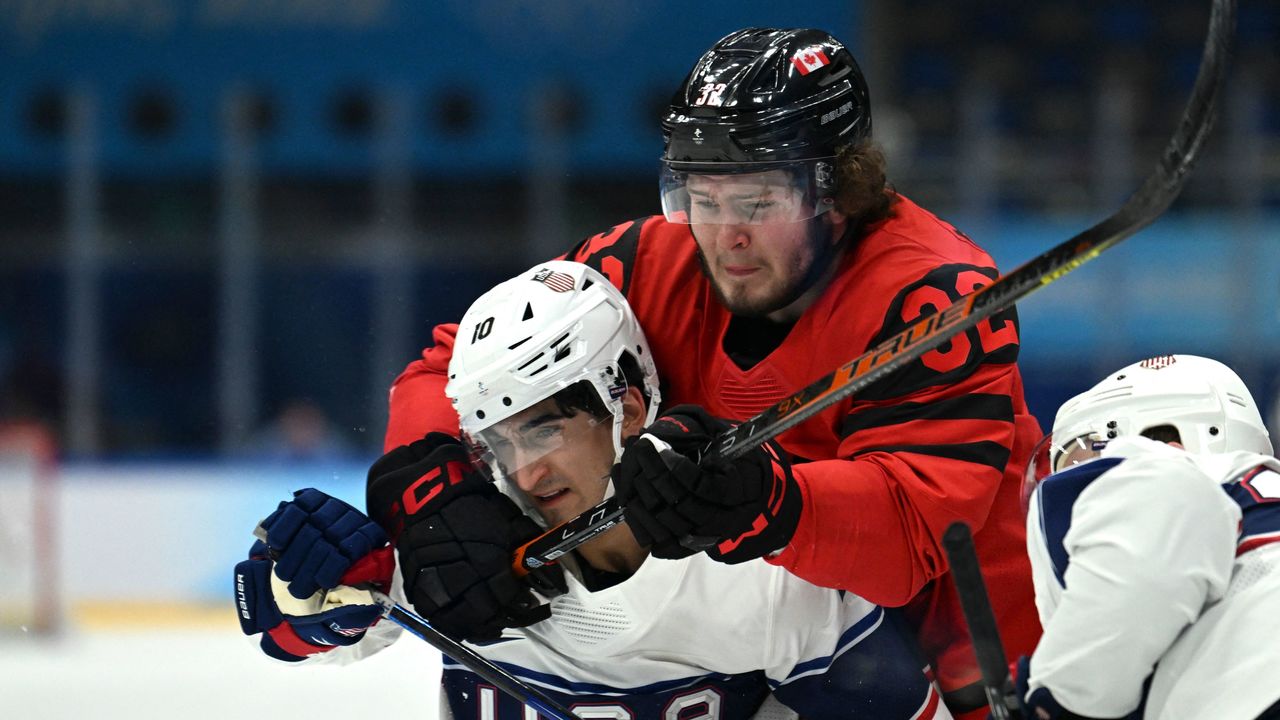
Munching minutes on the U.S. blue line, Brock Faber played 24:04 against Canada and 25:48 in the Germany game; coach David Quinn has leaned on him to kill five-on-threes and protect late leads. Despite getting hurt in the Canada game, defenseman Jake Sanderson was mobile and influential, spearheading frequent breakouts and assisting on the go-ahead goal. (This after Sanderson flew late to Beijing following his own stint in COVID-19 protocol.)
These players' rights belong to the following NHL teams: the Anaheim Ducks (McTavish), Buffalo Sabres (Power), Chicago Blackhawks (Commesso), Columbus Blue Jackets (Johnson), Los Angeles Kings (Faber), Montreal Canadiens (Farrell), Ottawa Senators (Sanderson), Seattle Kraken (Beniers), Toronto Maple Leafs (Abruzzese and Knies), and Vegas Golden Knights (Brisson).
Close to a third of the league is loving this, and smart teams are in the midst of elevating Juraj Slafkovsky on their draft boards. The 17-year-old power winger bagged Slovakia's first three goals at the Olympics and has four in total.
(Available to view in Canada)
WHAT A RELEASE 🏒 🚨
— CBC Olympics (@CBCOlympics) February 13, 2022
17-year-old Juraj Slafkovský continues to IMPRESS at #Beijing2022 with his 4th goal of the tournament so far 🇸🇰 pic.twitter.com/c4s41DoBQ9
(Available to view in the U.S.)
17-year-old top prospect Juraj Slafkovsky opened the scoring for Slovakia! #WinterOlympics
— Olympic Hockey on NBC (@NBCSportsHockey) February 10, 2022
📺: @USA_Network & @peacockTV
💻: https://t.co/lHabBgCmcS pic.twitter.com/AP5qXV03aE
Canada's ups and downs
There are limits to what can be learned from Canada handling China 5-0, though the host team did force Matt Tomkins to make 26 saves. His play spared Claude Julien a netminding conundrum.
Eddie Pasquale, whose save percentage over the past three KHL seasons is .924, looked steady when he stopped 23 shots against Germany. But the U.S. capitalized when Pasquale played the pass on a two-on-one, when he got pickpocketed in the trapezoid, and when he let the backbreaking goal squeak under his arm in the third period. Those plays wound up costing Canada a bye into the quarterfinals.
Up front, Canada struggled to establish its cycle game against the U.S. until late, and 17 third-period shots didn't produce a goal. The U.S. goalies have only lapsed once this tournament - when Strauss Mann whiffed on Mat Robinson's fling from the boards. Throughout the preliminary round, the Americans won battles, forced turnovers, finished chances, and entertained while playing a complete game.
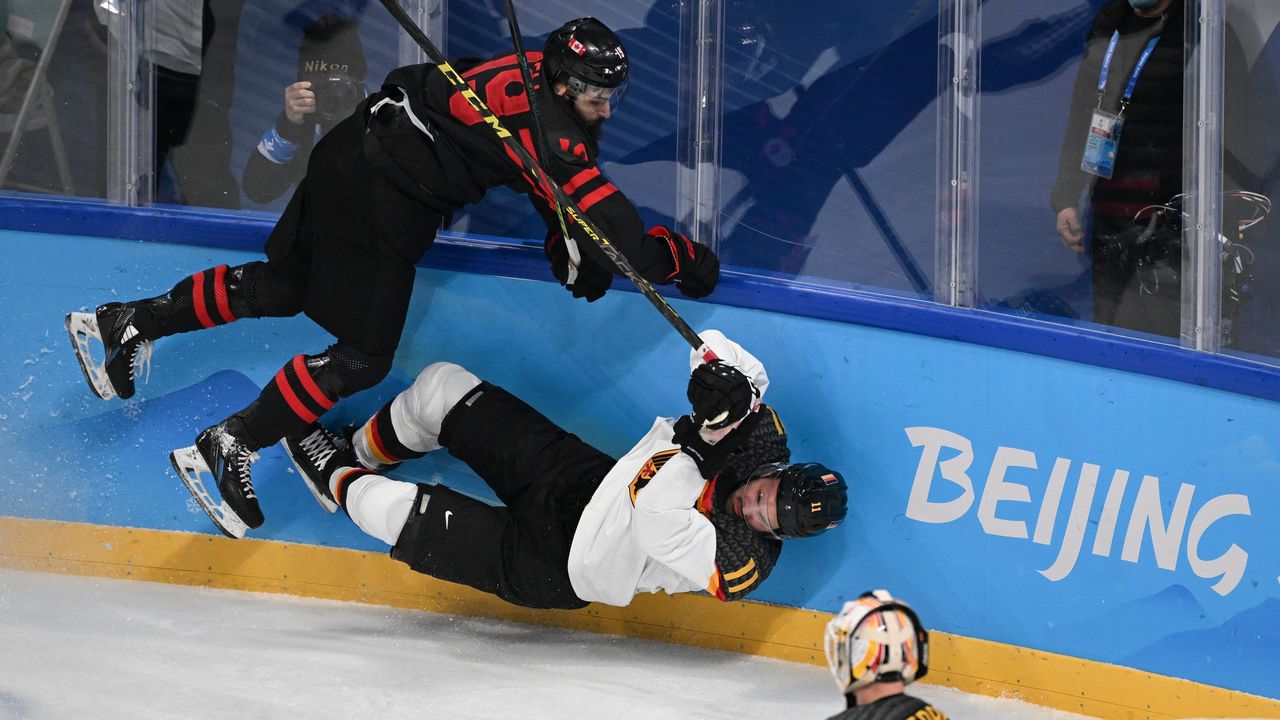
Canada did all that in the win over Germany, as forward trios that seemed to click immediately got the puck to scoring areas with ease. Canada's first goal of the tournament typified the team approach: O'Dell hammered Marco Nowak behind the net, Street secured possession, and Johnson fed Alex Grant, whose wrister from the point rang off the post and in.
Defensemen and the third and fourth forward lines account for eight of Canada's 12 goals, including Maxim Noreau's power-play slapper against the Germans. Two more goals have come courtesy of the KHL's third-leading scorer, Corban Knight, who struck shorthanded and tipped home one of Power's shots with the man advantage.
Eric Staal has two assists - on Noreau's and Robinson's goal - but the Chinese were the third straight opponent to quiet his line. He and McTavish have combined for 16 shots but haven't established consistent pressure, and Staal took elbowing and slashing penalties in the U.S. game, though one facilitated Knight's shorty. Daniel Winnik's puck retrieval and saucer pass in transition sprung Knight for that goal.
Winnik, the longtime NHLer who plays in Switzerland now, had tough luck late in his career. He left the Pittsburgh Penguins in free agency in 2015 and moved on from the Washington Capitals in 2017; both teams won the Stanley Cup the next year. Aside from a couple of Spengler Cup appearances, this is his first international tournament.
What can Canada do to snare him a medal? Ride Tomkins, stave off U.S. counterattacks if they meet again, and get the big guns going. If one play against China was promising, it might have been Josh Ho-Sang gaining the zone with speed and passing across his body to O'Dell, gifting him a tap-in. Tee up Staal or McTavish like that and maybe the floodgates will open.
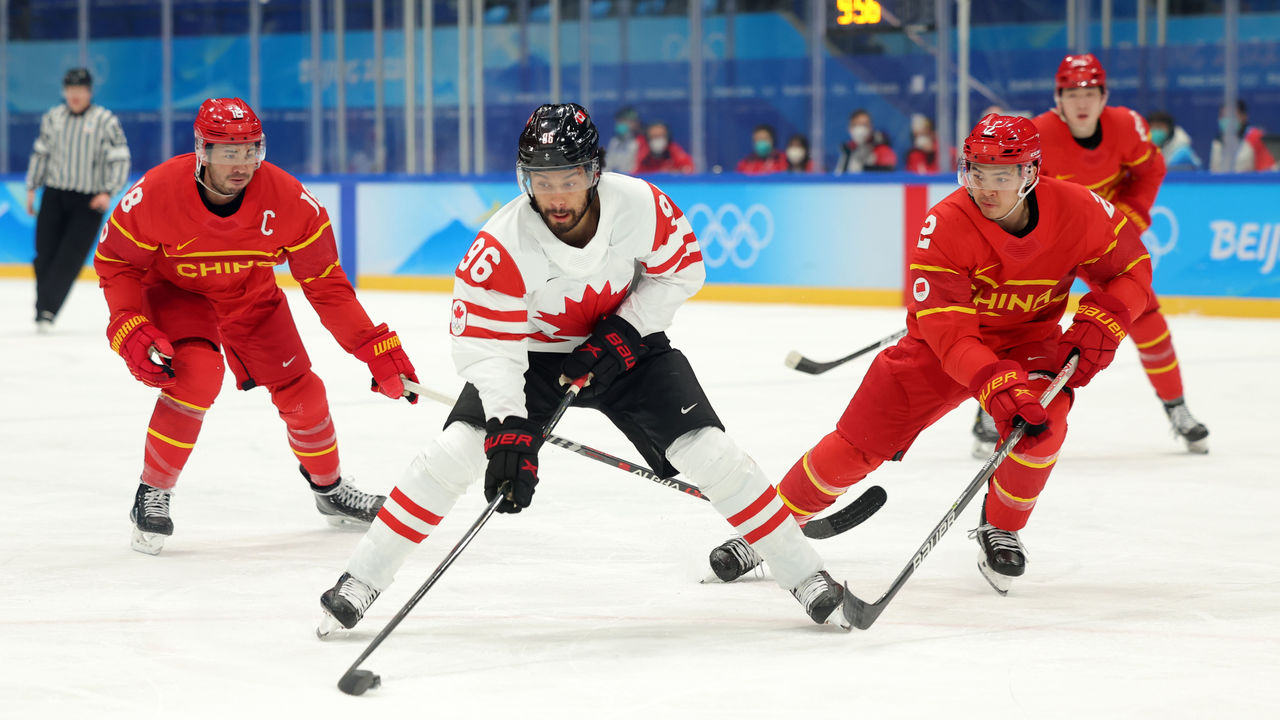
Potential quarterfinal matchups
These elimination games will determine who meets who in the quarters:
No. 6 Denmark vs. No. 11 Latvia: Monday at 11:10 p.m. ET
No. 8 Slovakia vs. No. 9 Germany: Monday at 11:10 p.m. ET
No. 7 Czech Republic vs. No. 10 Switzerland: Tuesday at 3:40 a.m. ET
No. 5 Canada vs. No. 12 China: Tuesday at 8:10 a.m. ET
And these showdowns await:
No. 1 U.S. vs. Slovakia or Germany: Losing twice and edging China 3-2 wasn't the start to the Olympics Germany envisioned, but at least the Slovaks have disappointed, too. Finland and Sweden torched them for 10 goals before Slovakia's third goalie Patrik Rybar entered the tournament, slowed the onslaught, and beat Latvia. The Germans are in the same position they were in four years ago, when they stunned top-seeded Sweden in the quarters and surged to the final.
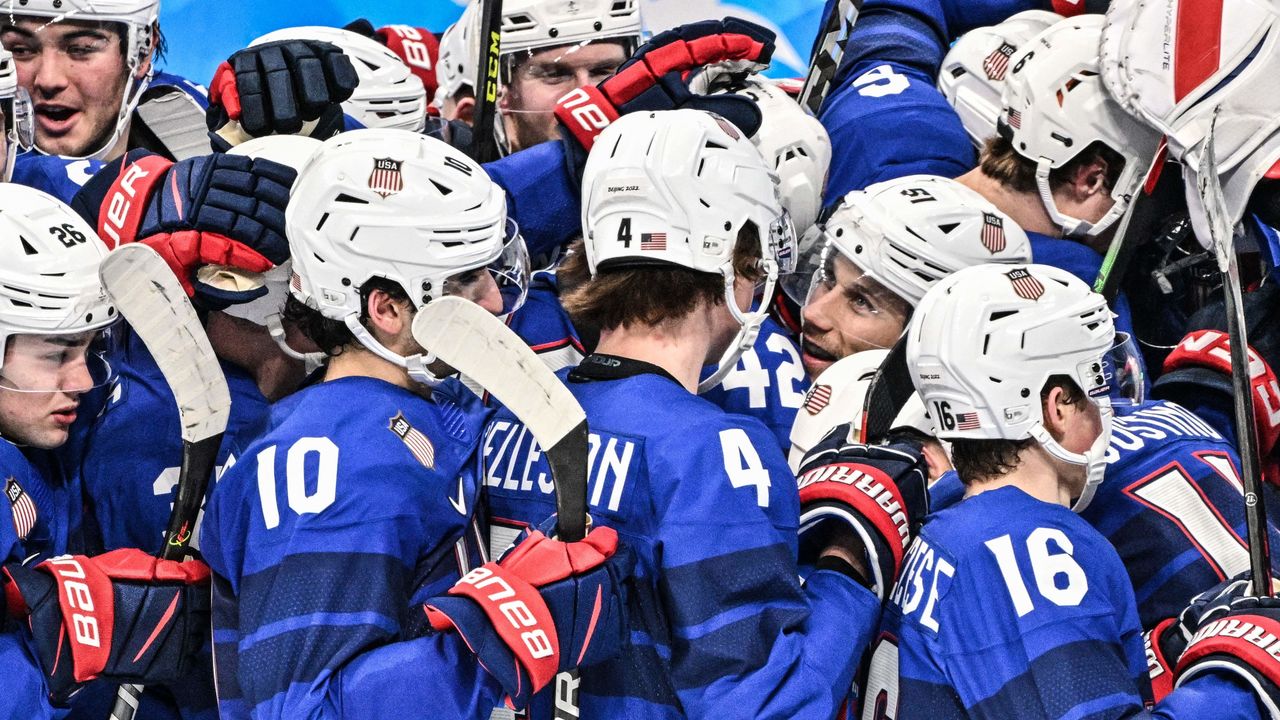
No. 2 Finland vs. Czech Republic or Switzerland: Valtteri Filppula, Markus Granlund, and Leo Komarov lead Finland's forwards in NHL experience, but it's KHL linemates Sakari Maaninen and Teemu Hartikainen who pace the Finns with five points apiece. Only China scored fewer goals than Switzerland's four in the preliminary round. That said, Switzerland managed to contain the Russians in a 1-0 loss and pushed the Czechs to a shootout when they met in Group B.
No. 3 ROC vs. Denmark or Latvia: Ranked lower than every Olympic team but China, the Danes upset the Czechs and Swiss in Group B play to earn a favorable first playoff matchup. The Russians blanked Denmark 2-0, but the defending gold medallists' offense and defense have yet to click simultaneously. Goalie Ivan Fedotov, the 6-foot-7 Philadelphia Flyers prospect, also shut out Switzerland before the Czechs shelled him for six goals.
No. 4 Sweden vs. Canada or China: Coughing up a 3-0 lead to Finland forces the Swedes to prepare to face Canada. However, by losing the Group C finale in overtime, they still get an extra day's rest. Sweden's standout scorer is Lucas Wallmark, the former NHL depth forward the Carolina Hurricanes traded for Vincent Trocheck in 2020. Wallmark's four goals tie him with Slafkovsky for the tournament lead. Anton Lander, the ex-Edmonton Oilers center, has scored twice himself.
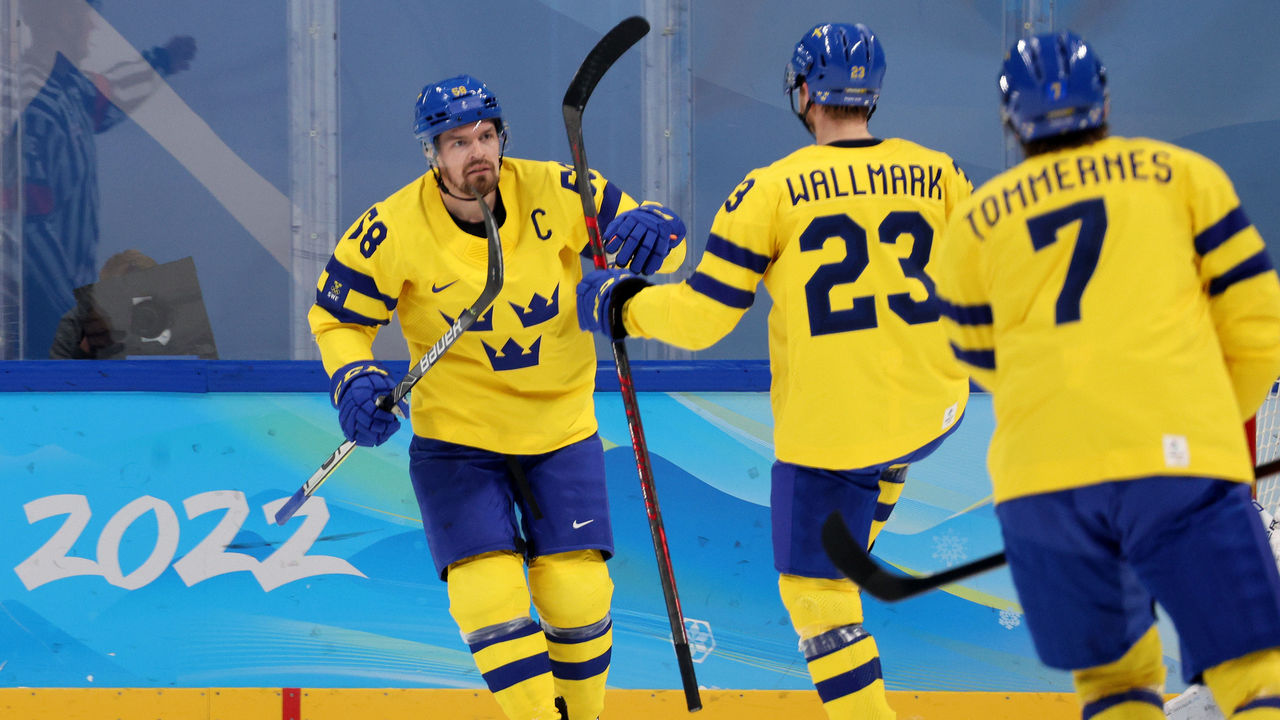
Remembering some guys
One silver lining to NHL stars staying home: other players get to skate in the Olympic spotlight.
The nifty Frans Nielsen went backhand, his signature move, to convert a penalty shot when Denmark beat the Czech Republic. The 37-year-old is his country's all-time leader in NHL games played (925), goals (167), and points (473); Nielsen's 49 career shootout goals are two shy of Jonathan Toews' league record.
(Available to view in Canada)
(Available to view in the U.S.)
Frans Nielsen on the PENALTY SHOT. 🚨
— Olympic Hockey on NBC (@NBCSportsHockey) February 9, 2022
Watch on: @USA_Network and @peacockTV pic.twitter.com/5tNbTnS2nF
After sniping in the shootout to defeat Switzerland, David Krejci assisted the game-tying and overtime goals in the Czechs' wild win over the Russians. The Boston Bruins alumnus is pursuing his first Olympic medal in three tries following quarterfinal exits in 2010 and 2014.
The Komarov deflection that broke Latvian hearts - he snapped a late tie in Finland's 3-1 win - came the day after Wallmark scored twice on Latvia himself.
Finally, three ex-NHLers - Brandon Yip, Ryan Sproul, and Jake Chelios - assisted Parker Foo's and Tyler Wong's goals when China lost to Germany. Short of earning a point, stressing out the Germans was about the best result China could have achieved in Group A. The home team wasn't humiliated.
Nick Faris is a features writer at theScore.
HEADLINES
- Wild acquire McCarron from Predators for 2nd-round pick
- Report: Predators send Cole Smith to Golden Knights for 3rd-round pick
- Report: Thomas trade talks between Sabres, Blues heating up
- 6 teams that will determine if trade deadline week is wild or mild
- Jack Hughes, Devils deal Panthers' playoff hopes another blow